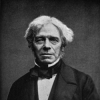Michael Faraday

Michael Faraday
Michael Faraday FRSwas an English scientist who contributed to the study of electromagnetism and electrochemistry. His main discoveries include the principles underlying electromagnetic induction, diamagnetism and electrolysis...
NationalityEnglish
ProfessionScientist
Date of Birth22 September 1791
jealous mean hard-work
With respect to Committees as you would perceive I am very jealous of their formation. I mean working committees. I think business is always better done by few than by many. I think also the working few ought not to be embaras[s]ed by the idle many and further I think the idle many ought not to be honoured by association with the working few.-I do not think that my patience has ever come nearer to an end than when compelled to hear ... long rambling malapropros enquiries of members who still have nothing in consequence to propose that shall advance the business.
weed thinking research
I am busy just now again on Electro-Magnetism and think I have got hold of a good thing but can't say; it may be a weed instead of a fish that after all my labour I may at last pull up.
weed sea fishing
It may be a weed instead of a fish that, after all my labour, I at last pull up.
past offering paper
When I came to know Mrs. Marcet personally; how often I cast my thoughts backward, delighting to connect the past and the present; how often, when sending a paper to her as a thank you offering, I thought of my first instructress.
regret science men
Your remarks upon chemical notation with the variety of systems which have arisen, &c., &c., had almost stirred me up to regret publicly that such hindrances to the progress of science should exist. I cannot help thinking it a most unfortunate thing that men who as experimentalists & philosophers are the most fitted to advance the general cause of science & knowledge should by promulgation of their own theoretical views under the form of nomenclature, notation, or scale, actually retard its progress.
silence mind criticism
The world little knows how many of the thoughts and theories which have passed through the mind of a scientific investigator, have been crushed in silence and secrecy by his own severe criticism and adverse examination!
distance exercise science
Occasionally and frequently the exercise of the judgment ought to end in absolute reservation. It may be very distasteful, and great fatigue, to suspend a conclusion; but as we are not infallible, so we ought to be cautious; we shall eventually find our advantage, for the man who rests in his position is not so far from right as he who, proceeding in a wrong direction, is ever increasing his distance.
knowledge men mind
If the term education may be understood in so large a sense as to include all that belongs to the improvement of the mind, either by the acquisition of the knowledge of others or by increase of it through its own exertions, we learn by them what is the kind of education science offers to man. It teaches us to be neglectful of nothing - not to despise the small beginnings, for they precede of necessity all great things in the knowledge of science, either pure or applied.
believe knowledge long
I have long held an opinion, almost amounting to conviction, in common I believe with many other lovers of natural knowledge, that the various forms under which the forces of matter are made manifest have one common origin; or, in other words, are so directly related and mutually dependent, that they are convertible, as it were, one into another, and possess equivalents of power in their action.
space words-of-wisdom lines
I cannot conceive curved lines of force without the conditions of a physical existence in that intermediate space.
views water feelings
Water is to me, I confess, a phenomenon which continually awakens new feelings of wonder as often as I view it.
certainty speculation
Speculations? I have none. I am resting on certainties.
men judging intelligence
The philosopher should be a man willing to listen to every suggestion,but determined to judge for himself.He should not be a respector of persons,but of things.Truth should be his primary object.
men certain
A man who is certain he is right is almost sure to be wrong.